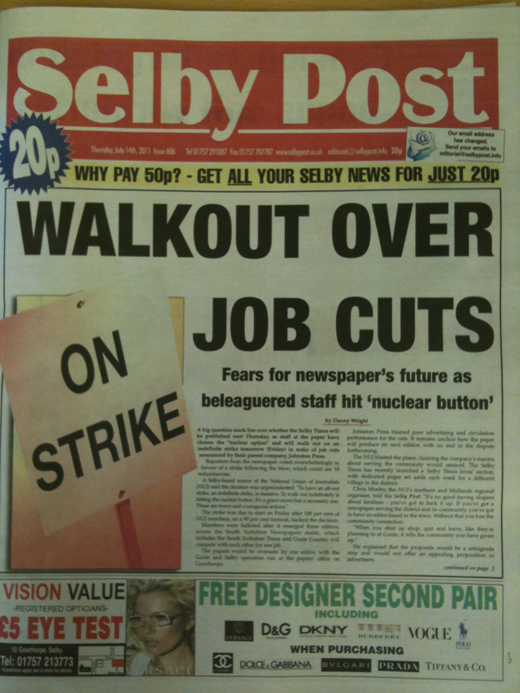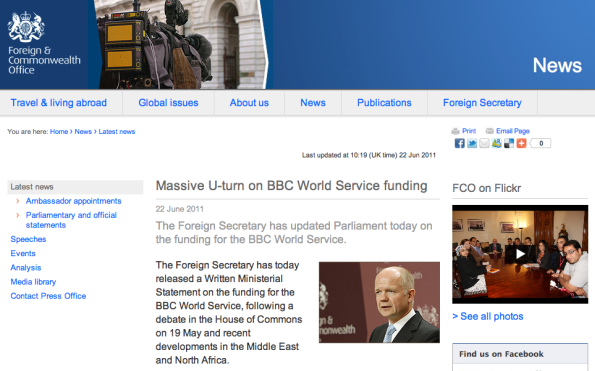The morning after the announcement that News International is to scrap the News of the World has predictably spawned a variety of reaction from the blogosphere.
Despite rumours that folding the newspaper in favour of a seven day Sun had been on the cards for a while (TheSunOnSunday.co.uk, TheSunOnSunday.com and SunOnSunday.co.uk were all registered on July 5, albeit by a private individual), a source at News International confirmed today that a Sunday edition of the paper wouldn’t be on the cards for several weeks to come.
This morning Times today led with a story that the collapse in advertising was due to online protest and the final nail in the coffin for the paper.
The withdrawal of advertising appeared to be in response to a public backlash that had been led primarily on the internet. Thousands of people had used Twitter and Facebook to express their outrage at allegations of phone hacking at the paper.
This was after a list of the News of the World’s advertising clients had been published online, encouraging people to send Twitter messages to the companies to express concern at the activities of the paper’s journalists.
You can read the full article here (behind the paywall).
Emily Bell, director of the Tow Centre for Digital Journalism and former director of digital content for Guardian News & Media sees the decision as part of a long line of bold and audacious moves from the Murdochs, from the bid to buy the Times, to the launch of Sky News, and recently the proposed takeover of BSkyB.
James’s Wapping moment sees him making a gesture he hopes will be grand enough to soften the focus of any phone-hacking inquiry, bold enough to allow the company to extricate itself from present trouble and, in the process, allow him to reshape News International around the digital television platforms he feels both more comfortable with and which are undoubtedly more profitable.
But what about the wider implications? Many are agreed that the decision is brutal and the loss of 200 journalists terrible, but Andrew Gilligan, London editor for the Sunday Telegraph, argues that it could also give way to a muzzled British press in the future. As talk turns to how press regulation should be managed, Gilligan says:
For be in no doubt: hateful as the behaviour of some journalists has been, we may now face something even worse. For many in power, or previously in power, the News of the World’s crimes are a God-given opening to diminish one of the greatest checks on that power: the media.
Regulation was also on Alan Rusbridger‘s mind yesterday, when he took part in a live Q & A regarding phone hacking (before NI announced the News of the World’s closure). Rusbridger drew attention to alleged weaknesses of the PCC (the code committee of which Rusbridger quit in November 2009) and the quandary of state v self-regulation. Today the Press Complaints Commission sought to defend its work following calls for it to be scrapped by both Labour leader Ed Miliband and prime minister David Cameron.
This hasn’t been a wonderful advertisement for self-regulation. The short answer is that, no, the PCC can’t go on as it is. Its credibility is hanging by a thread.
We did say this back in November 2009 when the PCC came out with its laughable report into phone-hacking. We said in an editorial that this was a dangerous day for press regulation – and so it’s turned out.
The PCC has this week withdrawn that report and has a team looking at the issues and at the mistakes it’s made in the past.
I don’t know how Ofcom could do the job without falling into the category of statutory regulation. Does anyone else?
On her blog former Channel 4 presenter Samira Ahmed also draws some comparisons with the past, saying that the affair is “only my second major moral outcry against the news media” during her twenty years in journalism, the first being the death of Princess Diana. Hugh Grant has won public approval over the last week or so because of his overt opposition to phonehacking, but Ahmed is wary of putting people like Grant on a pedestal.
Many celebrities understand the privacy trade-off with press coverage, or get their lawyers to settle a payoff. Incidentally we should be wary of deifying celebrities, such as Hugh Grant, who have publicly defended the principle of rich people taking out superinjunctions to cover up their bad behaviour, when there might be a legitimate public interest. But I’ve met ordinary people over the years whose suffering has been deeply compounded by salacious press intrusion.



